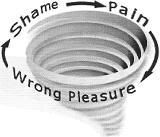Christmas Vacation Tour
This is the last day of my vacation from work; and since I didn't go anywhere - I will instead tour some websites I frequent often to see how they spent the last week: Ask me if I take the Bible literally, and I'll ask you, "Well, do you take the newspaper literally?" The answer is probably yes, because of course, the newspaper is filled with news, written by professional journalists and is nothing like the Bible … we read the newspaper according to its sections. We take the news pages literally. We know editorials express opinions. We understand sports metaphors. Opinions and metaphors are not literal. Christians read the Bible the same way. . .
It's just about Christmas, time to celebrate the miracle of the Incarnation--God becoming man, born of a virgin. It's an obvious opportunity to consider whether the Christian claims of miracles are still credible in light of modern science. Christianity without the Virgin Birth is about as meaningful as Christianity without the Resurrection; both miracles were necessary for God to have conquered sin and death as a man. But what about scientific objections to miracles?
These objections fall into three main versions: (1) Miracles can't happen, (2) Miracles shouldn't happen, (3) Miracles never have happened. The second of these will make more sense as I proceed. We'll start with the first, though.Few topics evoke as much emotion in our national conversation as the topic of race. In the wake of the Michael Richards episode, renown author Malcolm Gladwell writes about racism in his post "Defining a Racist". He proposes that a racist may be defined on the basis of three criteria: content, intention and conviction. Here are snippets of what he says with regard to each criteria.
You record a short message damning yourself to Hell, you upload it to YouTube, and then the Rational Response Squad will send you a free The God Who Wasn't There DVD. It's that easy.
I was hesitant to bring this up even for fear of helping someone to a hell I believe in; but luckily the site shows that scripture is "spiritually discerned" - what they consider to be "blasphemy of the spirit" isn't by my reading of this passage or its parallel in Matthew. Vincent at WorldMagBlog asks this question: Does This Site Matter?
INSTRUCTIONS:
You may damn yourself to Hell however you would like, but somewhere in your video you must say this phrase: "I deny the Holy Spirit."
Why? Because, according to Mark 3:29 in the Holy Bible, "Whoever blasphemes against the Holy Spirit will never be forgiven; he is guilty of an eternal sin." Jesus will forgive you for just about anything, but he won't forgive you for denying the existence of the Holy Spirit. Ever. This is a one-way road you're taking here.According to final results announced by the Interior Ministry, moderate conservatives opposed to Ahmadinejad won a majority of the seats, followed by reformists, who favor closer ties with the West. Analysts said Ahmadinejad supporters won less than 20 percent of local council seats nationwide. "People's vote means they don't support Ahmadinejad's policies and want change," Shariati, a leader of the Islamic Iran Participation Front, Iran's largest reformist party, told the Associated Press. "We consider this government's policy to be against Iran's national interests and security. It is simply acting against Iran's interests."
"Nothing that we despise in the other man is entirely absent from ourselves," wrote Dietrich Bonhoeffer while awaiting execution in a Nazi prison. "We must learn to regard people less in the light of what they do or omit to do, and more in the light of what they suffer."
and Bonnie points out I think people err by over-correcting error in both directions -- people try to cope with a lack of compassion by insisting that sin is not really sin. (And they also try to cope with sin by insisting that it's not really sin, or by blaming others.) People also try to cope with the first error by insisting, in a judgmental manner, that sin really is sin.










